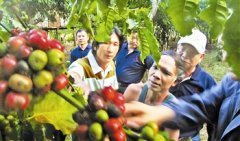Yunnan Ruili Coffee Germplasm Garden
Ruili Coffee Germplasm Garden
Ruili Coffee Germplasm Garden was approved by Yunnan General Administration of Land Reclamation in 1992 and established by Yunnan Dehong Institute of Tropical Agricultural Sciences. In 2009, it was named "Ruili Coffee Germplasm Garden" by the Ministry of Agriculture. The main tasks are: collection, introduction, preservation, identification, evaluation and innovative utilization of coffee germplasm resources at home and abroad, and provide germplasm utilization, resources and information sharing at home and abroad according to regulations, so as to serve the research, production and utilization of coffee breeding in the whole country.
The garden covers an area of 3 hectares and is located on the outskirts of Ruili City, Dehong Prefecture, Yunnan Province. As of December 2009, a total of 275 coffee germplasm resources of 4 species were preserved, mainly collected from Hainan, Yunnan and foreign countries. It is the largest and largest coffee germplasm conservation research base in China. Agronomy, biology and other disciplines were used to identify and evaluate the agronomic and biological characteristics of the preserved coffee germplasm resources, which laid a foundation for identifying and screening a number of high-yield, high-quality and disease-resistant coffee varieties in the future.
The nursery collects excellent varieties with high yield, high quality and rust resistance, with a total extension area of 20, 000 hectares, and the approved variety DTARI028 is being popularized and applied. At present, there are 11 researchers in the resource garden, including 1 enjoying the special allowance of Yunnan provincial government, 3 senior agronomists, 2 master's degree and 1 master's degree.
Important Notice :
前街咖啡 FrontStreet Coffee has moved to new addredd:
FrontStreet Coffee Address: 315,Donghua East Road,GuangZhou
Tel:020 38364473
- Prev

Walk into the secret "coffee tribe" of the Mekong River
The primitive jungle of the Mekong River, which obscures the sun, is pregnant with strange animals and plants with different personalities. Seemingly mundane journey, often the next second there will be a new surprise. Yesterday, by chance, a scientific research team broke into a coffee village that lived in seclusion in the jungles of southern Laos and where locals could not be found. The naked villagers produce the world's top coffee in an almost primitive way.
- Next

Introducing trees in coffee plantations can boost yields
Can you imagine a tree mixed with your coffee? It may sound like a bad idea, but a new study shows that growing trees mixed with coffee bushes increases bird populations and coffee production.
Related
- What is the difference between Indonesian Sumatra Mantinin coffee and gold Mantinin? How to distinguish between real and fake golden Mantelin coffee?
- What does bypass mean in coffee? Why can hand-brewed coffee and water make it better?
- Unexpected! Ruixing Telunsu lattes use a smoothie machine to foam milk?!
- % Arabia's first store in Henan opens into the village?! Netizen: Thought it was P's
- Does an authentic standard mocha coffee recipe use chocolate sauce or powder? Mocha Latte/Dirty Coffee/Salty Mocha Coffee Recipe Share!
- What is the difference between Vietnam egg coffee and Norway egg coffee? Hand-brewed single product coffee filter paper filter cloth filter flat solution!
- What is the difference between sun-cured and honey-treated coffee? What are the differences in the flavor characteristics of sun-honey coffee?
- How to make Italian latte! How much milk does a standard latte use/what should the ratio of coffee to milk be?
- How to make butter American/butter latte/butter Dirty coffee? Is hand-brewed coffee good with butter?
- Is Dirty the cold version of Australian White? What is the difference between dirty coffee/decent coffee and Australian white espresso?

